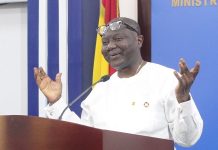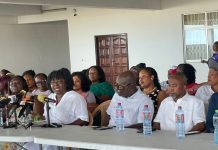Ghana’s cocoa regulator, COCOBOD, has announced that Licensed Buying Companies will, from October 1, 2021, switch to the use of electronic weighing scales.
Chief Executive, Joseph Boahen Aidoo, told the media that over 44,000 weighing scales have already been procured and distributed to the LBCs.
According to him, the rationale is to resolves concerns by cocoa farmers that some LBCs are adjusting their weighing scales which in effect, impact on their profit margins.
“We have worked on this together with the LBCs in total agreement to change the weighing scales from the manual to the electronic system. We wanted the kind that can be used everywhere in the country. So we have procured both electronic and solar scales. This will end the days when our cocoa farmers felt cheated by LBCs who they claimed adjusted their weighing scales,” he stated.
The new electronic scales were recommended by the Ghana Standards Authority, following an inspection of the mechanical scales presently used across the country.
This follows the recent airing of a 2018 documentary on scale tampering within the cocoa sector by the Joy News channel.
Joseph Boahen Aidoo explained that his outfit “takes this issue of weighing scale tampering very seriously and as such they have a regressive impact on interventions that COCOBOD has put in place to improve the earnings and livelihoods of cocoa farmers.”
Under the preventive measure, COCOBOD will import the GSA-recommended electronic sealable weighing scales, which meet a set of tamper-proof standards. This ensures that the measure is rolled out quickly and that there is a common standard for all. In addition, LBCs will be required to use the new scales only.
Dr Emmanuel Opoku, Deputy CEO of COCOBOD said, in the meantime, while the procurement process for the new weighing scales is ongoing, the punitive measure will be applied in the upcoming cocoa season.
LBCs will be surcharged with the monetary equivalent of the aggregated weight from cocoa sheds across the country where the LBC in question may have short-changed the unsuspecting farmers, once GSA confirms the adjustment of such weighing scales.
The amount of which the LBCs have been surcharged will then be paid to the farmers who sold their cocoa at those sheds.
Even though the documentary by the Multimedia Group is overdue, given that it was produced in 2018, and does not capture the steps which COCOBOD has taken since 2018 to tackle the problem, Dr. Opoku, nonetheless, commended the media house and its journalist for making a documentary on the problem.
He added that “the work of the media in shining light on the situation and improvement as we progress, as well as the vigilance of our field staff and the cocoa farmers themselves, will together play a crucial role in eliminating this cocoa canker.”
He expressed confidence that COCOBOD’s Farmer Data/Cocoa Information Management System, which is underway, when ready, will improve overall monitoring of the supply chain so that, issues that come up can be promptly addressed.
Meanwhile, Joseph Boahen Aidoo has called on all stakeholders to join forces with COCOBOD to safeguard cocoa farmers’ immediate and future welfare, and create a fair and rewarding environment for all to operate.







































